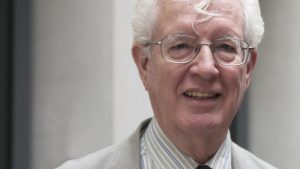 By Giampi Alhadeff is chair of the Labour Movement for Europe
By Giampi Alhadeff is chair of the Labour Movement for Europe
It was fitting that Jeremy Corbyn began his recent session of prime minister’s questions with a tribute to one of the giants of the movement, Rodney Bickerstaffe, who died earlier this month. (see tribute on LabourList website)
The Labour leader made special mention of Bick’s role in getting the national minimum wage into law. But the former general secretary of the public service union Unison and president of the National Pensioners’ Convention believed that fighting for the disadvantaged didn’t stop at national borders.
He took his international work very seriously and among those paying tribute to him were fellow campaigners in Peru, Egypt, Finland, Sweden the Philippines and South Africa.
Rodney was proud – and who wouldn’t be — that Nelson Mandela recorded a video tribute that was played at his retirement party.
He died last week week at the age of 72 and the TUC general secretary Frances O’Grady said: “Not every union leader can say they were loved. But Rodney was loved by everyone.”
Bick made you proud to be British. He epitomised this country’s core values of fairness and solidarity with the poor — values that are the true mark of a great country and they resonate around the world.
For the labour movement the death of Rodney Bickerstaffe was the big event of last week. His passing eclipsed the Tory psycho drama in Manchester. He died on the day that that Boris Johnson was strutting his stuff before the Tory faithful.
What a contrast.
On the one hand, a foreign secretary, whose rancid manoeuvrings and mishaps shame his country, his party and the leader scared to sack him.
On the other a man of honesty and humanity loved across the Labour movement and around the world.
In Britain, Bick was president of War on Want and the Palestine Solidarity Campaign and on the international stage president of the Solidar Global Network which put him in the forefront of campaigning to mitigate the damaging effects of globalisation.
Solidar brought together trade unionists and NGOs from Asia, South America, Africa and Europe around the principle that workers rights are human rights and should be included in international agreements and trade deals. Bick led delegations to the World Trade Organisation summits in Seattle, Doha, Cancun and Hong Kong.
I was general secretary of Solidar during Rodney’s presidency. It was hard work but great fun. I remember the Cancun summit where Bick demanded that the delegation met at 7.30am each day.
We protested we were looking forward to an early morning swim. Simple, he said: “See you on the beach at 6.30am.”
There was one problem for Bick. When he took his glasses off he couldn’t see those Caribbean waves come crashing waves towards him. Every day he ended with his feet flying skywards.
Rodney was “brilliant” in linking the Solidar Global Network with key politicians including UN secretary general Antonio Guterres, former Danish and Australian prime ministers Poul Nyrup Rasmussen and Kevin Rudd and the former Europe minister Glenys Kinnock.
He was particularly effective in working to change the position of Britain and the EU towards including workers’ right in WTO agreements. EU trade commissioner Pascal Lamy and his successor Peter Mandelson held him in high regard.
He had the ear of Labour leaders. At the Social Forum in Porto Alegre in Brazil he spent time with Ed Miliband and two years later in Mumbai he was doing the same with Jeremy Corbyn.
I am sure Rodney’s internationalism will inspire the Labour government he was desperate to see come to power.
He was passionate and principled but armed with a deadly sense of humour. He was such a great pal. He had that rare ability to make everyone he came into contact feel that they mattered and what they had to say of the utmost importance.
